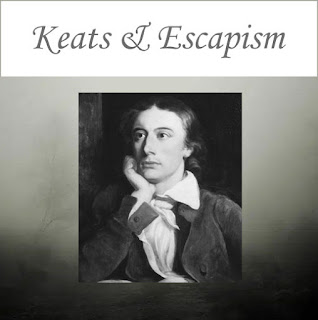But it is also true that happy moments are very scarce and transitory within the scope of human life. As a result, most of us possess an insatiable urge to pursue happiness even in our imagination. This tendency is also reflected in literature as well. The English Romantic poet, John Keats is widely considered by many as an escapist. Keats had a predilection for escapism since for him the world of imagination was full of beauty, perfection, and permanence, which the materialistic world cannot ever promise. However, his act of escapism never prolonged as he was forcefully shook by the harsh realities of life. Therefore, in Keats’ poem we always see a conflict between the materialistic world and the ideal world.
In Ode to Psyche, Keats, though his imagination, escapes into the antiquity to express his craze for beauty. In this poem, he chose the mythological character, Psyche to symbolize the human soul. By his imagination, here, Keats breaks through the bonds of the mortal and the finite. Psyche was a mortal and later became a deity, indicating immortality.
In Ode to Nightingale, Keats is elated by the song of the nightingale. For him the nightingale’s song is the symbol of eternal joy. The poet asserts that one day he will grow old and ultimately die. Moreover, he also believes that beauty and love also short-lived. But he strongly believes the nightingale is immortal and its song will never fade away. However, suddenly the poet realizes that he cannot remain in the world of nightingale forever since the world is not as pleasant as the nightingale’s ideal world. So, he returns into the actual world to face the pains and anxieties of the materialistic world.
In Ode On a Grecian Urn the poet uses an antique urn to escape in the realm of imagination. He adopted the urn to symbolize the immortality of art. Although created many centuries back, the urn still survives to evince the creativity of its creator. The ideal world of the attic urn soon shatters when Keats feels that the real world is full of impermanence and suffering. He also ascertains that a true beauty can only be found by accepting the real world with all its blemishes or shortcomings rather than trying to escape from it.
To Autumn is another exquisite poem by John Keats, where he is lost in the sensuous beauty of the autumn season. Through his imagination he describes the joyous moments in nature which include ripeness in fruits. However, at the end of the poem Keats returns from the sensuous world of ripeness to the actual world, where life is an eternal process of ripening, decay and death.
Thus it is clear that Keats initially tries to transport himself into the world of imagination solely to escape from the perpetual pain, suffering, and dreariness of the materialistic world. However, his escape is always transitory since he had a realization that he cannot disregard the human fate.
Be Informed Whenever a New Post is Published.
If you enjoyed this article, SUBSCRIBE now for FREE to get regular updates delivered to your E-mail inbox.Your E-mail is safe with us - No spam, we promise.








0 Comments:
Post a Comment